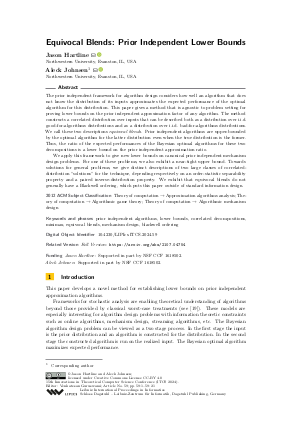Equivocal Blends: Prior Independent Lower Bounds
Authors
Jason Hartline  ,
Aleck Johnsen
,
Aleck Johnsen 
-
Part of:
Volume:
15th Innovations in Theoretical Computer Science Conference (ITCS 2024)
Part of: Series: Leibniz International Proceedings in Informatics (LIPIcs)
Part of: Conference: Innovations in Theoretical Computer Science Conference (ITCS) - License:
 Creative Commons Attribution 4.0 International license
Creative Commons Attribution 4.0 International license
- Publication Date: 2024-01-24
File

PDF
LIPIcs.ITCS.2024.59.pdf
- Filesize: 0.84 MB
- 21 pages
Document Identifiers
Related Versions
- Full Version https://arxiv.org/abs/2107.04754
Subject Classification
ACM Subject Classification
- Theory of computation → Approximation algorithms analysis
- Theory of computation → Algorithmic game theory
- Theory of computation → Algorithmic mechanism design
Keywords
- prior independent algorithms
- lower bounds
- correlated decompositions
- minimax
- equivocal blends
- mechanism design
- blackwell ordering
Metrics
- Access Statistics
-
Total Accesses (updated on a weekly basis)
0PDF Downloads0Metadata Views
Abstract
The prior independent framework for algorithm design considers how well an algorithm that does not know the distribution of its inputs approximates the expected performance of the optimal algorithm for this distribution. This paper gives a method that is agnostic to problem setting for proving lower bounds on the prior independent approximation factor of any algorithm. The method constructs a correlated distribution over inputs that can be described both as a distribution over i.i.d. good-for-algorithms distributions and as a distribution over i.i.d. bad-for-algorithms distributions. We call these two descriptions equivocal blends. Prior independent algorithms are upper-bounded by the optimal algorithm for the latter distribution even when the true distribution is the former. Thus, the ratio of the expected performances of the Bayesian optimal algorithms for these two decompositions is a lower bound on the prior independent approximation ratio. We apply this framework to give new lower bounds on canonical prior independent mechanism design problems. For one of these problems, we also exhibit a near-tight upper bound. Towards solutions for general problems, we give distinct descriptions of two large classes of correlated-distribution "solutions" for the technique, depending respectively on an order-statistic separability property and a paired inverse-distribution property. We exhibit that equivocal blends do not generally have a Blackwell ordering, which puts this paper outside of standard information design.
Cite As Get BibTex
Jason Hartline and Aleck Johnsen. Equivocal Blends: Prior Independent Lower Bounds. In 15th Innovations in Theoretical Computer Science Conference (ITCS 2024). Leibniz International Proceedings in Informatics (LIPIcs), Volume 287, pp. 59:1-59:21, Schloss Dagstuhl – Leibniz-Zentrum für Informatik (2024)
https://doi.org/10.4230/LIPIcs.ITCS.2024.59
BibTex
@InProceedings{hartline_et_al:LIPIcs.ITCS.2024.59,
author = {Hartline, Jason and Johnsen, Aleck},
title = {{Equivocal Blends: Prior Independent Lower Bounds}},
booktitle = {15th Innovations in Theoretical Computer Science Conference (ITCS 2024)},
pages = {59:1--59:21},
series = {Leibniz International Proceedings in Informatics (LIPIcs)},
ISBN = {978-3-95977-309-6},
ISSN = {1868-8969},
year = {2024},
volume = {287},
editor = {Guruswami, Venkatesan},
publisher = {Schloss Dagstuhl -- Leibniz-Zentrum f{\"u}r Informatik},
address = {Dagstuhl, Germany},
URL = {https://drops.dagstuhl.de/entities/document/10.4230/LIPIcs.ITCS.2024.59},
URN = {urn:nbn:de:0030-drops-195878},
doi = {10.4230/LIPIcs.ITCS.2024.59},
annote = {Keywords: prior independent algorithms, lower bounds, correlated decompositions, minimax, equivocal blends, mechanism design, blackwell ordering}
}
Author Details
Funding
- Hartline, Jason: Supported in part by NSF CCF 1618502.
- Johnsen, Aleck: Supported in part by NSF CCF 1618502.
References
-
Amine Allouah and Omar Besbes. Prior-independent optimal auctions. In Proceedings of the 2018 ACM Conference on Economics and Computation, pages 503-503. ACM, 2018.

-
Patrice Assouad. Deux remarques sur l'estimation. Comptes rendus des séances de l'Académie des sciences. Série 1, Mathématique, 296(23):1021-1024, 1983.

-
Peter Auer, Nicolo Cesa-Bianchi, and Paul Fischer. Finite-time analysis of the multiarmed bandit problem. Machine learning, 47(2):235-256, 2002.

-
David Blackwell. Equivalent comparisons of experiments. The annals of mathematical statistics, pages 265-272, 1953.

-
Allan Borodin and Ran El-Yaniv. Online Computation and Competitive Analysis. Cambridge University Press, Cambridge, UK, 1998.

-
Clément L Canonne et al. Topics and techniques in distribution testing: A biased but representative sample. Foundations and Trendsregistered in Communications and Information Theory, 19(6):1032-1198, 2022.

-
Peerapong Dhangwatnotai, Tim Roughgarden, and Qiqi Yan. Revenue maximization with a single sample. Games and Economic Behavior, 91:318-333, 2015.

-
Yiding Feng and Jason D Hartline. An end-to-end argument in mechanism design (prior-independent auctions for budgeted agents). In 2018 IEEE 59th Annual Symposium on Foundations of Computer Science (FOCS), pages 404-415. IEEE, 2018.

-
Yiding Feng, Jason D Hartline, and Yingkai Li. Revelation gap for pricing from samples. In Proceedings of the 53rd Annual ACM SIGACT Symposium on Theory of Computing, pages 1438-1451, 2021.

- Hu Fu, Nicole Immorlica, Brendan Lucier, and Philipp Strack. Randomization beats second price as a prior-independent auction. In Proceedings of the Sixteenth ACM Conference on Economics and Computation, EC ’15, page 323, New York, NY, USA, 2015. Association for Computing Machinery. URL: https://doi.org/10.1145/2764468.2764489.
-
Yiannis Giannakopoulos and Elias Koutsoupias. Duality and optimality of auctions for uniform distributions. SIAM Journal on Computing, 47(1):121-165, 2018.

-
A. V. Goldberg, J. D. Hartline, A. Karlin, M. Saks, and A. Wright. Competitive auctions. Games and Economic Behavior, 55:242-269, 2006.

- Jason Hartline and Aleck Johnsen. Extension of minimax for algorithmic lower bounds. Working Paper. https://arxiv.org/abs/2311.17038, 2023.
-
Jason Hartline, Aleck Johnsen, and Yingkai Li. Benchmark design and prior-independent optimization. In 61st Annual Symposium on Foundations of Computer Science, IEEE FOCS 20. Institute of Electrical and Electronics Engineers, 2020.

-
Jason Hartline and Tim Roughgarden. Optimal mechanism design and money burning. In Proceedings of the 40th ACM Symposium on Theory of Computing, pages 75-84", 2008.

- Jason Hartline and Tim Roughgarden. Optimal platform design. CoRR, arxiv.org/abs/1412.8518, 2014. URL: https://arxiv.org/abs/1412.8518.
-
Lucien LeCam. Convergence of estimates under dimensionality restrictions. The Annals of Statistics, pages 38-53, 1973.

- Roger B. Myerson. Optimal auction design. Mathematics of Operations Research, 6(1):58-73, 1981. URL: https://doi.org/10.1287/moor.6.1.58.
-
Tim Roughgarden. Beyond worst-case analysis. Communications of the ACM, 62(3):88-96, 2019.

-
A. C. Yao. Probabilistic computations: Toward a unified measure of complexity. In 18th Annual Symposium on Foundations of Computer Science (sfcs 1977), pages 222-227, 1977.

